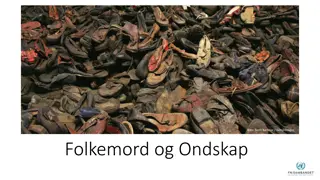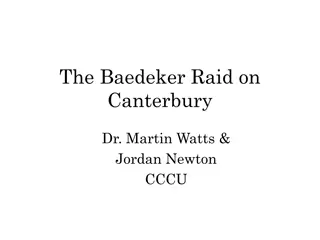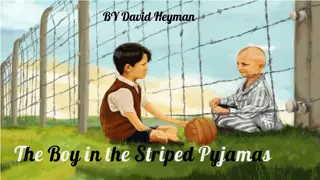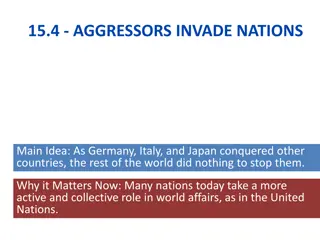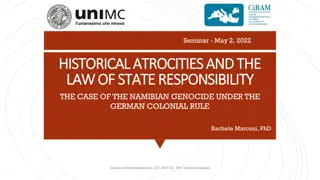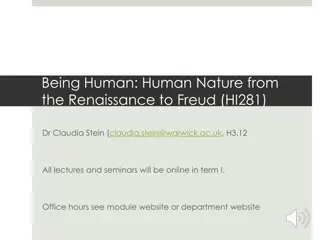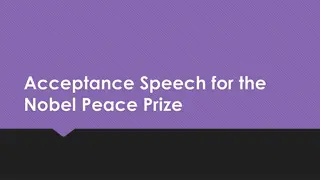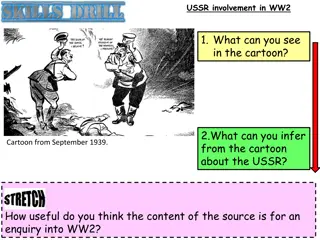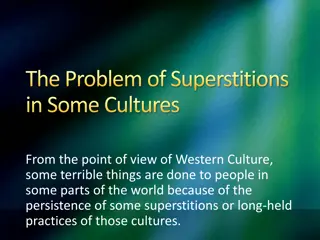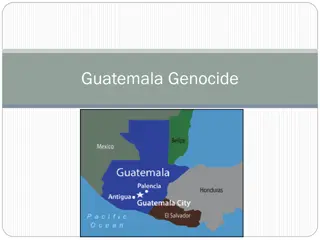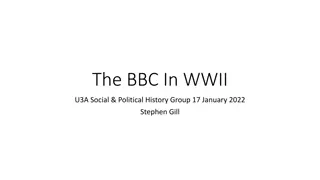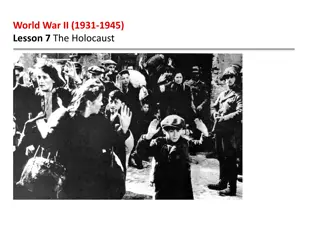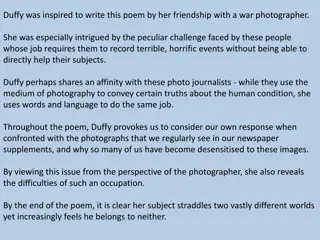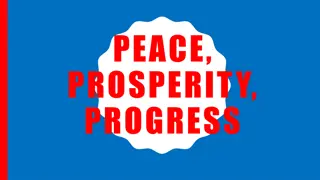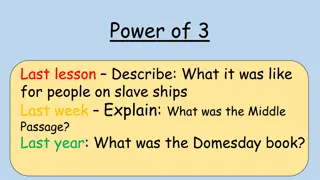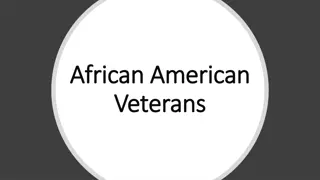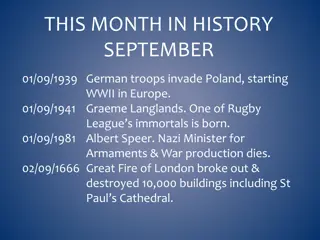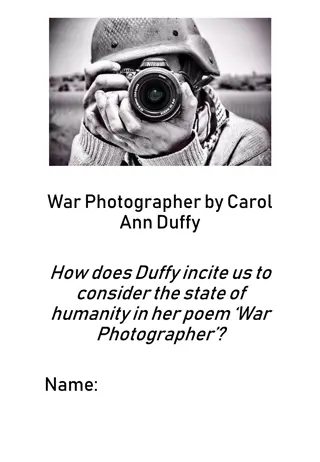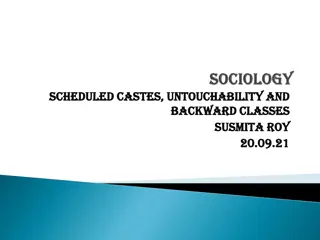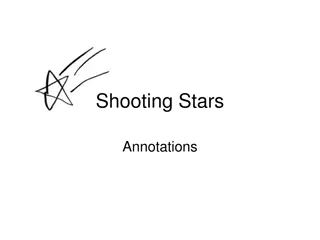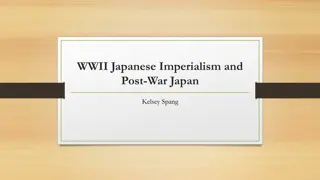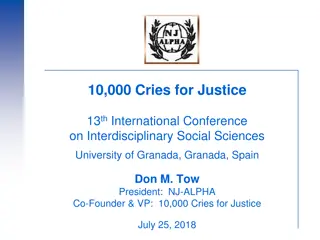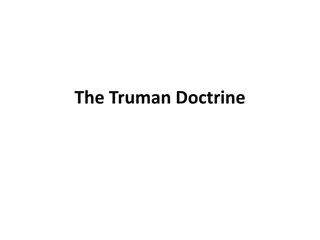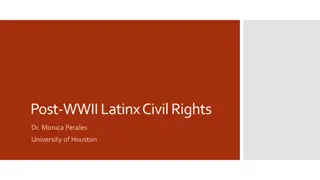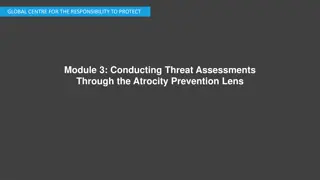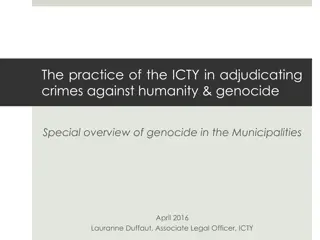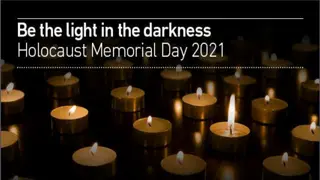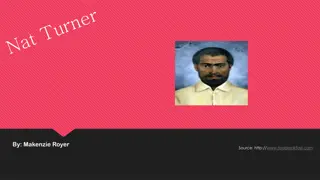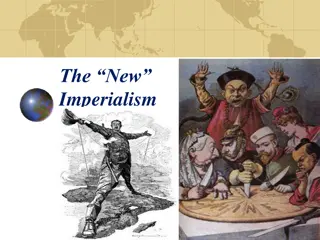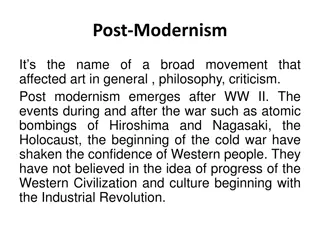Uncovering the Violent History of Capitalistic Enclosures
Explore the historical context of capitalist enclosures, their violent impacts on peasants, and the moral justifications used to conceal these atrocities. Delve into how economic narratives created moral bubbles to justify violent acts, as examined through the lens of Marx's analysis. Unveil the par
1 views • 11 slides
Understanding Genocide: Connection Between Ethnic Cleansing and Evil
Explore the concept of genocide, as defined by the UN, through historical events like the Armenian Genocide and the Holocaust. Delve into the depths of evil and its association with acts of genocide within societies, touching upon the banality of evil and the systematic eradication of entire groups.
2 views • 10 slides
Examining the Global Centre for Climate Change and Atrocity Prevention
The document presents a case for establishing a pilot scheme for the Global Centre for Climate Change and Atrocity Prevention by Dr. Ben L. Parr. It includes an introduction outlining the need for such an initiative, an examination of the Climate Change and Atrocity Prevention NGO universe, and disc
9 views • 12 slides
The Impact of WWII Bombing Raids on Canterbury and Surrounding Cities
Explore the historical events of WWII bombing raids on Canterbury, Coventry, London, and other cities, focusing on the destruction caused, civilian reactions, strategic objectives, and preparatory measures taken. Witness the escalation of heavy raids, the targeting of cultural landmarks, and the shi
0 views • 25 slides
The Boy in the Striped Pyjamas: A Heart-Wrenching Tale of Friendship and Loss
The Boy in the Striped Pyjamas follows the story of Bruno, a German officer's son, who befriends a Jewish boy named Shmuel during World War II. Their friendship blossoms despite the barriers of a concentration camp, ultimately leading to a tragic end. The narrative delves into themes of innocence, f
0 views • 8 slides
Japan's Aggression in China: The Atrocities of Invasion
Japan's aggressive expansion in the 1930s led to the invasion of China, marked by incidents like the seizure of Manchuria and the brutal atrocities in Nanjing. The international community's failure to intervene effectively underscores the importance of collective action in global affairs, a lesson s
0 views • 24 slides
Historical Atrocities and State Responsibility: Namibian Genocide Seminar
Explore the legal analysis of the Namibian Genocide under German colonial rule, focusing on international responsibility and reparations. Delve into the historical background, negotiations, and the 2021 Joint Declaration between Germany and Namibia regarding the atrocities. Understand the events fro
1 views • 23 slides
Exploring the Evolution of Human Nature in Western Culture
Delve into the dynamic construction of human nature throughout history, from the Renaissance to modern times, questioning its transhistorical or relative essence. Discover how societal values shape our perceptions of human behavior and identity. Reflect on changing views of human nature in the face
0 views • 11 slides
Reflections on Elie Wiesel's Nobel Peace Prize Acceptance Speech
Elie Wiesel's Nobel Peace Prize acceptance speech raises thought-provoking questions about neutrality, solidarity, and freedom. Through powerful quotes, he emphasizes the importance of taking a stand against oppression and supporting victims to prevent atrocities. Wiesel's profound insights challeng
0 views • 4 slides
The USSR and Nazi Germany: The Pact of 1939
In the lead-up to WWII, the USSR signed a non-aggression pact with Nazi Germany, shocking the world. This pact included secret clauses dividing Poland and avoiding conflict for ten years. The USSR's alliance with Germany was a strategic move by Stalin due to fear of invasion and perceived weakness o
0 views • 13 slides
Cultural Challenges: Addressing Superstitions and Harmful Practices
Various cultures uphold long-standing superstitions and harmful practices, such as female infanticide and belief in witches, raising ethical dilemmas for Western observers. While understanding cultural contexts is crucial, confronting atrocities like children being accused of witchcraft necessitates
0 views • 23 slides
Genocide in Guatemala: Tragic History and Pursuit of Justice
The Guatemala genocide, perpetrated by military dictator Rios Montt, inflicted horrific atrocities on the indigenous Ixil Mayans from 1982 to 1983. Massacres, torture, and displacement marked this dark chapter. Despite international condemnation and legal actions, justice remains elusive.
0 views • 7 slides
The BBC in WWII: A Historical Overview
The BBC played a significant role during WWII, adapting to wartime conditions and providing essential news and entertainment to the public. From its pre-war development to its transformation during the outbreak of war, the BBC served as a vital communication tool and source of information for the Br
4 views • 31 slides
Understanding the Horrors of the Holocaust in World War II
Explore the dark period of World War II with a focus on the Holocaust, tracing its roots, progression, and impact. Delve into Hitler's campaign against the Jews, his final solution, and the establishment of Nazi death camps. Learn about the devastating consequences of genocide, the United States' re
0 views • 18 slides
Exploring the Depths of a War Photographer's Psyche
A contemplative analysis of a poem inspired by the challenging role of war photographers, their struggle to document atrocities, and the impact on their mental state. Through structured stanzas and metaphorical imagery, the poet invites reflection on our response to such images and the photographer'
0 views • 36 slides
Post-WWII America: Progress, Politics, and the Election of 1948
Lakewood, California's post-WWII boom symbolized the era's prosperity and status symbol of homeownership. Truman's Fair Deal faced Republican opposition, leading to postwar political shifts, including the 22nd Amendment and Taft-Hartley Act. The Election of 1948 saw Truman navigating Democratic fact
0 views • 20 slides
Exposing the Horrors of the Middle Passage: A Journalist's Investigation
Investigate the deplorable conditions endured by slaves during the Middle Passage on slave ships in the 18th/19th century. Uncover the cramped, unhygienic, and brutal reality faced by enslaved individuals as they were forcibly transported from Africa to the New World. Analyze why such atrocities occ
0 views • 6 slides
African American Veterans and Pioneers in Military History
African Americans played significant roles in military history, from the Tuskegee Airmen breaking barriers in WWII to Doris Miller's heroic actions at Pearl Harbor and Harriet M. West Waddy's advocacy for African American women in the military during WWII. Their stories highlight courage, resilience
0 views • 7 slides
Georgia Studies Week at a Glance: February 21-25, 2022
This week in Ms. Smith's Georgia Studies class focuses on the impact of World War II on Georgia's development economically, socially, and politically. Students will delve into events leading to American involvement in the war, the contributions of key figures and industries in Georgia, and the role
0 views • 9 slides
Significant Events in September History
September has seen notable historical events like the start of WWII in Europe with the invasion of Poland, the end of WWII with Japan's surrender, the Treaty of Paris ending the American Revolution, and the birth and death anniversaries of various influential figures throughout history.
0 views • 30 slides
Insights into Genocide and War Crimes in the Former Yugoslavia
Explore the harrowing events surrounding the genocide in Srebrenica, as well as the ICC statute defining genocide. Witness the testimonies of individuals like Drazen Erdemovic and Dragan Obrenovic, shedding light on the atrocities committed during the Yugoslav Wars. Delve into the plea of guilty, re
0 views • 31 slides
Exploring Humanity Through "War Photographer" by Carol Ann Duffy
Carol Ann Duffy prompts readers to contemplate the grim realities of war and its impact on humanity through her poem "War Photographer." The poem delves into the isolated world of a photographer developing harrowing images captured in conflict zones, contrasting the peace of his darkroom with the ch
0 views • 4 slides
Understanding Scheduled Castes, Untouchability, and Backward Classes in India
The Scheduled Castes (SCs) and Scheduled Tribes (STs) in India are officially recognized groups, representing about 16.6% and 8.6% of the population respectively. They were historically known as Depressed Classes and have been given reservation status for political representation. The government has
0 views • 20 slides
Meaning Behind Shooting Stars: From Wishes to Tragedy
Exploring the dual significance of shooting stars - from being symbols of wishes and hope to representing the tragic fate of millions during the Holocaust. Analysis of Carol Ann Duffy's poem bringing to light the harrowing experiences of Jewish victims. The content dives into the profound themes of
0 views • 13 slides
WWII Japanese Imperialism and Post-War Japan
Explore the historical narrative of WWII Japanese imperialism, the factors leading to Japanese control of Pan-Asia, interference from the West, rational for Pearl Harbor, and the aftermath including the fall of Japan and the devastating effects of the atomic bombs on Hiroshima and Nagasaki.
0 views • 17 slides
Impact of WWII on US Homefront: Social, Political, and Economic Turning Points
Investigate the significant shifts in the US homefront during WWII through social, political, and economic lenses. Explore the changes in the economy, roles of African Americans and women, and the transformation of civilian life. Reflect on major events like the involvement of the Tuskegee Airmen, i
0 views • 22 slides
The Legacy of Gukurahundi: Ndebele Particularism in Post-Crisis Zimbabwe
A campaign of terror known as Gukurahundi targeted the Ndebele people in Matabeleland, Zimbabwe, with over 20,000 civilians killed in the 1980s. This dark chapter continues to haunt the country as the Ndebele's experiences and history are marginalized by the dominant Shona narrative. Ndebele particu
0 views • 9 slides
Unveiling Historical Injustices: 10,000 Cries for Justice Conference
The 13th International Conference on Interdisciplinary Social Sciences at the University of Granada delves into the troubled history of WWII atrocities, focusing on Japan's unacknowledged crimes against humanity. From the horrors of vivisection on American POWs to the non-prosecution of Unit 731 lea
0 views • 11 slides
America's Patriotic Victory Gardens During WWI and WWII
Victory gardens became popular during WWI and WWII due to food shortages in the United States caused by the need to send produce overseas for the troops. The National War Commission encouraged Americans to plant their own gardens, leading to a movement that promoted self-sufficiency and community co
1 views • 8 slides
Medicine in Germany during the Third Reich (1933-1945): A Historical Study
Explore the dark history of medicine in Germany under the Third Reich, delving into topics such as eugenics, the T4 program, sterilization laws, and medical experiments. Uncover the atrocities committed in the name of healing and delve into the aftermath post-Holocaust, reflecting on the implication
0 views • 67 slides
The Cold War Events: Truman Doctrine, Marshall Plan, Berlin Airlift, American Responses, NATO & Warsaw Pact
The Cold War era saw significant events such as the Truman Doctrine, where the US aimed to support free peoples against communism. The Marshall Plan and the Berlin Airlift helped in the recovery of Europe post-WWII. American responses included the creation of CIA, NSC, and the Department of Defense.
0 views • 11 slides
Latinx Civil Rights Activism Post-WWII
Explore the history of Latinx civil rights activism post-WWII with a focus on the impact of political organizations, significant leaders, and strategies employed. Understand the changes in the United States resulting from the civil rights movement and learn from the lessons of Latinx civil rights hi
0 views • 14 slides
Conducting Threat Assessments Through the Atrocity Prevention Lens
This module from the GLOBAL CENTRE FOR THE RESPONSIBILITY TO PROTECT focuses on conducting threat assessments through an atrocity prevention lens. It covers risk identification, situational awareness in field settings, information collection methods, addressing vulnerabilities of women and children,
0 views • 20 slides
Overview of ICTY's Adjudication of Crimes Against Humanity and Genocide
Explore the significant role of the International Criminal Tribunal for the former Yugoslavia (ICTY) in adjudicating crimes against humanity and genocide, focusing on the history, international crimes, specific trials, and achievements in bringing perpetrators to justice. The presentation provides i
0 views • 27 slides
Evolution of Ethics in Human Subjects Research
Human Subjects Research (HSR) or Human Subjects Use (HSU) plays a vital role in medical research, with a historical background and strict ethical guidelines in place. From past atrocities to contemporary practices, the use of human subjects has evolved, emphasizing the importance of informed consent
0 views • 26 slides
Remembering the Holocaust: Auschwitz Liberation and Holocaust Memorial Day
The 27th of January marks Holocaust Memorial Day, commemorating the liberation of Auschwitz by Russian soldiers. This day serves as a reminder of the atrocities of the Holocaust, where six million Jews were murdered by Hitler and the Nazis during World War II. The Holocaust Memorial Trust emphasizes
0 views • 11 slides
The Story of Nat Turner: From Childhood to Rebellion
Born in 1800, Nat Turner experienced a traumatic childhood marked by slavery and visions from God. Raised in a religious family, he had a deep-seated hatred for slavery. Turner's rebellion in 1831 led to the deaths of many, as he sought to overthrow the oppressive system. His army of 70 slaves wreak
0 views • 16 slides
The New Imperialism - Historical Overview of European Colonization
Explore the era of the New Imperialism through descriptions of North Africa, Egypt, Belgian Congo, and American missionary accounts. Learn about the impact of imperialism on various territories and the atrocities committed in the pursuit of resources and control.
0 views • 27 slides
Evolution of Amplifiers: From WWII to Modern Integrated Circuits
Amplifiers have come a long way since their invention during WWII for mathematical operations. The modern amplifier is compact, high-performing, and integrated with transistors, resistors, and capacitors on a single chip. The properties of operation amplifiers, input modes, and differential inputs a
0 views • 10 slides
Understanding Post-Modernism: Art, Philosophy, and Criticism After WWII
Post-Modernism emerged in the aftermath of WWII, challenging traditional beliefs in progress and shaping a new perspective on chaos, reality, and fiction in art, philosophy, and social systems. It blurs boundaries between high and low art forms, explores metafiction and pastiche, and emphasizes the
0 views • 6 slides

